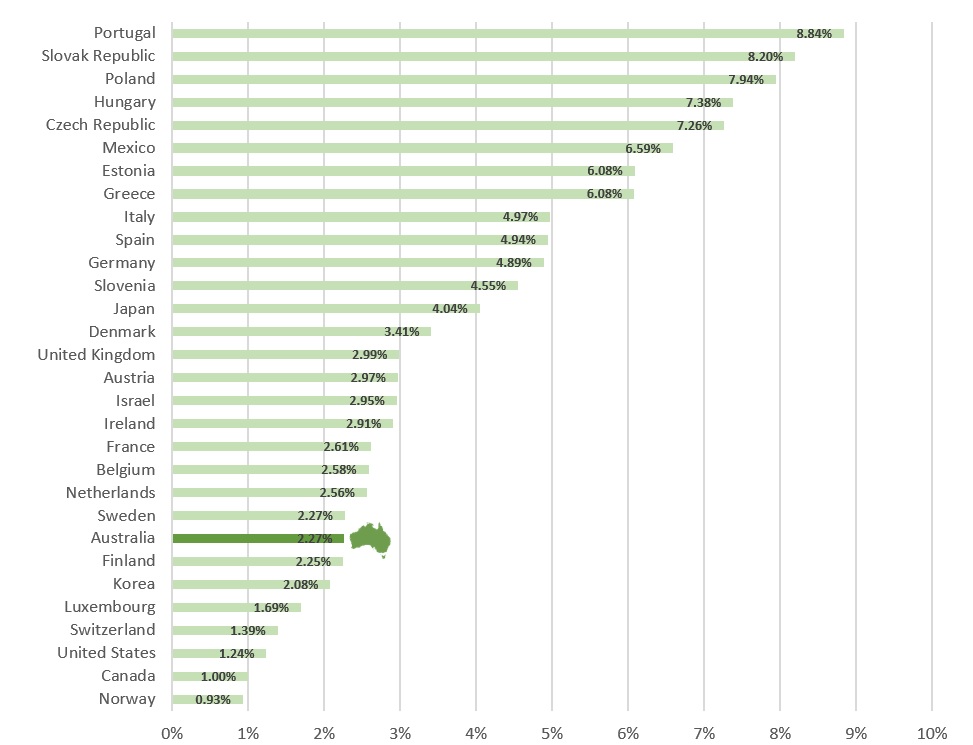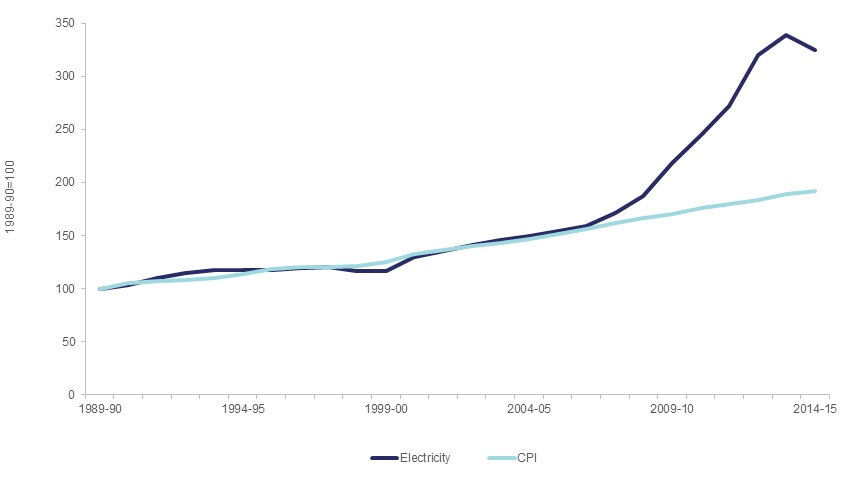Worldwide electricity prices: How does Australia compare?
Electricity prices across countries around the world vary due to factors like infrastructure maintenance, government energy and climate change policies, local energy resources and diversity in generation assets. As reported in the Energy in Australia 2015 report, Figure 1 shows electricity prices in 2014 from leading economies worldwide. As can be seen, Australia’s power prices, (at equivalent purchasing power exchange rates) were lower than the OECD average of 23.03 US cents per kilowatt-hour (c/kWh). At 20.47 US c/kWh Australian 2014 electricity prices are also low by overall international standards.
Figure 1: OECD household electricity prices, PPP measure 2014

Purchasing power parity (PPP) is used to adjust the data to exchange rate differences and ensures a like-for-like comparison when purchasing the equivalent quantity of goods or services in all countries[i].
From this comparison, electricity for household consumers was the most expensive in Germany, Portugal, and Poland, while it was cheapest in the United States, Canada and Norway. There was a significant gap of around 29 US c/kWh between the least and most expensive power prices.
Figure 2: Portion of a day's wages needed to buy the average day of electricity usage [i]

Source: OECD website
The average day of electricity usage is 15.52kW, according to Electricity Gas Australia 2015.
Figure 2 shows the amount of a day’s wage to cover the cost of an average day’s electricity consumption. The figure uses average annual wages in US dollars (on a PPP basis) to calculate an affordability rate for electricity.
As shown in Figure 2, Australians use only 2.27 per cent of their daily wages to meet their power bills with the average daily income calculated at US$140.13. This is amongst the best affordability ratings when compared to the other 29 countries shown.
Affordability is a bigger challenge in European nations. The Portuguese, for example, had to use 8.84 per cent of their daily wage to meet their power bills. And while Germany has the highest electricity prices (Figure 1), given its higher average annual salary levels, the daily household electricity bill only accounts for 4.89 per cent of a day’s wages.
Recent Australia household electricity prices
Figure 3: Australian residential electricity price trend

Source: ABS (2015) cat no 6401, Consumer Price Index, Australia
While Australia enjoys relatively low electricity prices in comparison to other countries, over the 2004-2014 period, retail electricity prices for households nearly doubled. Increases were largely caused by the need to invest in network infrastructure due to the need to replace aging assets[ii]. Residential electricity prices fell in 2014/15 following the abolishment of the Australian Government’s carbon tax.
Industrial prices
Industrial prices are important for the competitiveness of energy-intensive businesses. International consulting group NUS has carried out a survey of industrial prices (which are based on individual contracts and so not necessarily publicly disclosed) for many years. The repeal of the carbon price has returned Australia to the lower end of the 18 surveyed countries, after two years amongst the more expensive countries. Industrial prices are more sensitive to wholesale prices than household tariffs.
Figure 4: Industrial prices, NUS Group, 2013-14 International Electricity and Natural Gas Report and Price Survey
Related Analysis
2025 Election: A tale of two campaigns
The election has been called and the campaigning has started in earnest. With both major parties proposing a markedly different path to deliver the energy transition and to reach net zero, we take a look at what sits beneath the big headlines and analyse how the current Labor Government is tracking towards its targets, and how a potential future Coalition Government might deliver on their commitments.
Navigating Energy Consumer Reforms: What is the impact?
Both the Essential Services Commission (ESC) and Australian Energy Market Commission have recently unveiled consultation papers outlining reforms intended to alleviate the financial burden on energy consumers and further strengthen customer protections. These proposals range from bill crediting mechanisms, additional protections for customers on legacy contracts to the removal of additional fees and charges. We take a closer look at the reforms currently under consultation, examining how they might work in practice and the potential impact on consumers.
International Energy Summit: The State of the Global Energy Transition
Australian Energy Council CEO Louisa Kinnear and the Energy Networks Australia CEO and Chair, Dom van den Berg and John Cleland recently attended the International Electricity Summit. Held every 18 months, the Summit brings together leaders from across the globe to share updates on energy markets around the world and the opportunities and challenges being faced as the world collectively transitions to net zero. We take a look at what was discussed.
Send an email with your question or comment, and include your name and a short message and we'll get back to you shortly.




